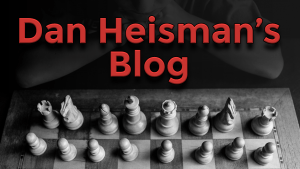Q&A with Coach Heisman Sep 12, 2014
"When you start a game, how do you get into the mood of concentrating from move 1?"
"If you are in a bad mood, how do you prevent this from negatively affecting your play?"
Those are good questions, and they are not completely unrelated. It only takes one bad move to lose a game, so it makes sense that you want to avoid the situation where you sit down, play a few fast sloppy moves, and then are faced with a lost position for the remainder of the game.
One thing I suggest is: "Anything which takes away from your concentration in determining 'What is the best move I can find in a reasonable amount of time, given the clock situation and the board position?' should be avoided if at all possible."
That means worrying about your previous game - or even bad moves you made earlier in the game - is counterproductive. Strong players know they are going to make mistakes and can brush them off as part of the game; weaker players sometimes beat themselves up, with the result being likely further bad play.
If something is bothering your concentration, stop the game and get the tournament director. The TD will determine if your concern is reasonable and, if so, take steps to ameliorate it. You have the right to concentrate during your game. If you are not sure of the rules, stop your clock and clearly ask the TD about the concerned rule. Never guess at rules or follow the advice of your opponent!
The following is a suggestion that may help get you "in the mood" to do this at the start of the game. Every good scoresheet contains a bunch of information fields: Name of event, date, round, board number, opening, players' names and ratings, time control. By ritualling filling this in neatly and carefully, you are "zoning" yourself from the real world into the chess world, where that 100% concentration is needed from move 1. If you want to avoid putting in your opponent's rating, that is understandable as many players benefit from not knowing if their opponent is much higher rated (and playing with fear or too much caution) or lower (overconfidence, playing too fast).
Always play with confidence, aggression, and respect for your opponent's moves and ideas.
-----------
"Who are your favorite (famous) chess players?"
When asked this question I usually include names like Keres, Lasker, Fischer, Shirov, and Kasparov. But of course there's a special place for Coach Donald Byrne. One day Coach Byrne was regaling us with stories from his latest European tournament and his comeraderie with players from around the world, including those behind the Iron Curtain.
"Coach", I interrupted, "It seems you are on good terms with every chess player in the world!"
That stopped him. He thought for a second and replied,
"Well, everyone but Reshevsky" and then he paused again and smiled,
"But no one gets along with Reshevsky!"
------------
Do chess players always just improve gradually or do they sometimes jump by leaps and bounds?"
In the long run an improving player's rating (which only reflects your playing strength, after all), on average, should look a little bit like a sinusoid but with an upward bias. In other words, take two steps forward for every one step back.
In general, most information is going to be assimilated slowly and the macro effect will be gradual. However, that is not to say that occasionally players don't find epiphanies which break them through barriers and to next levels.
In my Novice Nook "Beginner Misconceptions" I talk about the biggest breakthough that happened to me in item "c". When I first started I figured that I would give my opponent some problems to solve with my moves and he would give me some with his moves and, being relatively intelligent, I would do OK.
However, big shock: my opponents kept giving me problems I could not solve and I lost game after game. Finally I came to the realization that in chess it is relatively easy to give some opponents (like me!) unsolvable problems and then they, no matter how smart, just lose. So I learned to take a LOT more time on my moves making sure that if made a move, my opponent would not have any such problems he could give me on his next move. In other words, I started seriously checking to see if all my candidate moves were safe. That was my epiphany although, as I explained in The Secrets of Real Chess, it was not until 30 years later when I saw my son Delen's friend Will Yu discover the same thing, that I was able to categorize and write about this discovery.
Q&A with Coach Heisman is now a once-a-month show, usually the first Friday of the month, still 5-6:30 PM ET. See you next time!






